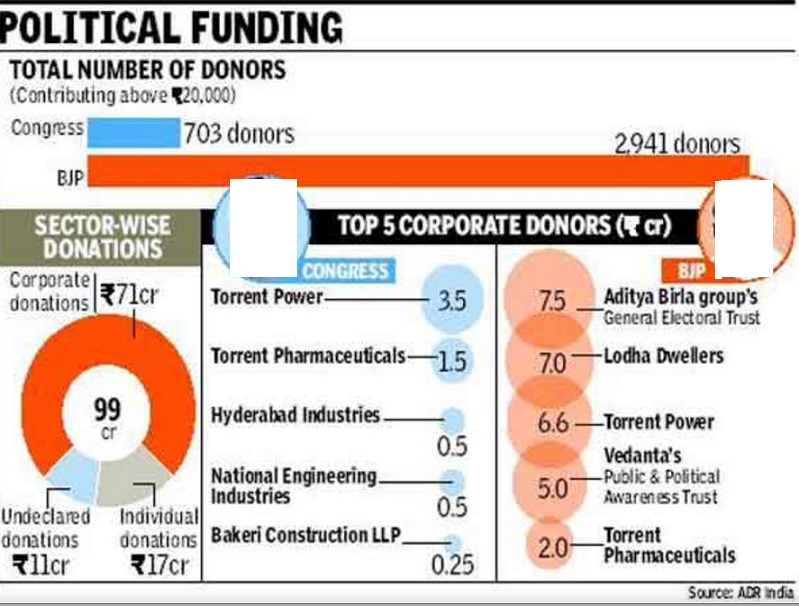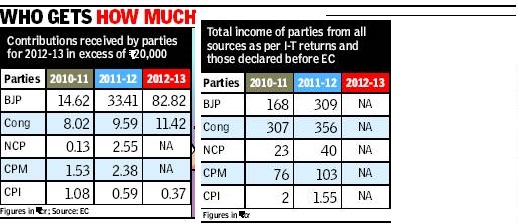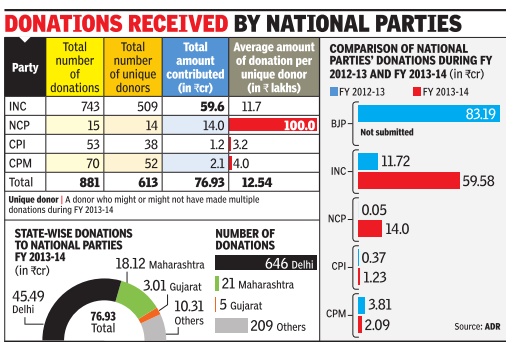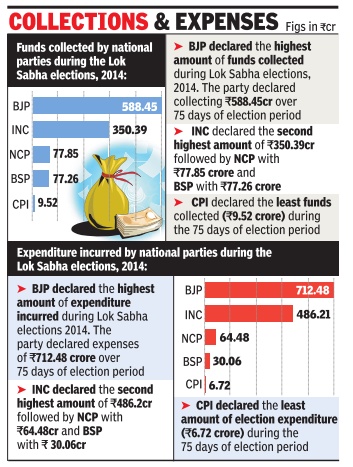Political parties' funding and finances: India
(→Funding by the bigger corporates) |
(→Exemption for Congress) |
||
| Line 19: | Line 19: | ||
Congress had got exemption from paying income tax under Section 13A o f the I-T Act for the last 30 years except for 199495 and that is haunting it now as the process got lengthy and the tax determination became erratic. | Congress had got exemption from paying income tax under Section 13A o f the I-T Act for the last 30 years except for 199495 and that is haunting it now as the process got lengthy and the tax determination became erratic. | ||
| − | + | Appearing for Congress, senior advocate Mohan Parasaran said the party had been allowed exemption from filing income tax returns from 1986-87 till 2014-15, the only exception being 1994 95. “Though there is substantial compliance with the provisions of Section 13A of I-T Act for the assessment year in question, the exemption was denied to Congress on account of procedural formalities that have been complied with,“ Parasaran said. | |
| − | + | ||
| − | Appearing for Congress, senior advocate Mohan Parasaran said the party had been allowed exemption from filing income tax returns from 1986-87 till | + | |
Immediately after Congress lost power at the Centre in 1996, the assessment officer on March 31, 1997 computed the total income at Rs 25.12 crore. Congress appealed against it before the commissioner of income tax, which determined the net income at Rs 15.85 crore. Congress appealed against this before the Income Tax Appellate Tribunal and the matter was sent back to the assessing officer. The I-T department then appealed against the ITAT order before the Delhi HC. | Immediately after Congress lost power at the Centre in 1996, the assessment officer on March 31, 1997 computed the total income at Rs 25.12 crore. Congress appealed against it before the commissioner of income tax, which determined the net income at Rs 15.85 crore. Congress appealed against this before the Income Tax Appellate Tribunal and the matter was sent back to the assessing officer. The I-T department then appealed against the ITAT order before the Delhi HC. | ||
Revision as of 13:52, 23 September 2016
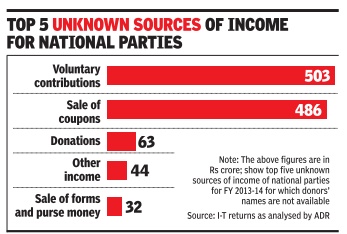

This is a collection of articles archived for the excellence of their content.
|
Contents |
Income tax under Sec 13A of I-T Act
Exemption for Congress
The Times of India, Aug 02 2016
Dhananjay Mahapatra
SC seeks Centre's response on denying Cong tax relief in '94-'95
Congress had got exemption from paying income tax under Section 13A o f the I-T Act for the last 30 years except for 199495 and that is haunting it now as the process got lengthy and the tax determination became erratic.
Appearing for Congress, senior advocate Mohan Parasaran said the party had been allowed exemption from filing income tax returns from 1986-87 till 2014-15, the only exception being 1994 95. “Though there is substantial compliance with the provisions of Section 13A of I-T Act for the assessment year in question, the exemption was denied to Congress on account of procedural formalities that have been complied with,“ Parasaran said.
Immediately after Congress lost power at the Centre in 1996, the assessment officer on March 31, 1997 computed the total income at Rs 25.12 crore. Congress appealed against it before the commissioner of income tax, which determined the net income at Rs 15.85 crore. Congress appealed against this before the Income Tax Appellate Tribunal and the matter was sent back to the assessing officer. The I-T department then appealed against the ITAT order before the Delhi HC.
When the appeal was pending, the assessing officer on March 31, 2003 passed an order determing the taxable income at Rs 1.44 crore. On appeal, the I-T commissioner on December 9, 2004, when the Congress had returned to power, assessed the taxable income at Rs 38.38 lakh.
Congress appealed to the ITAT, which issued certain directions leading to ultimate determination of a loss of Rs 60.23 lakh to the party during 1994-95, which was earlier determined at Rs 25.12 crore. But the process came to naught when Delhi HC on March 23 this year denied tax exemption under Section 13A to the party for that year and affirmed non-admissibility of evidence taken into account by CIT and ITAT.
Funding by the bigger corporates
Biggest corporate donors: 2004-2012
Birla group largest donor to BJP's poll fund
The Times of India Himanshi Dhawan,TNN | Jun 26, 2014
NEW DELHI: Industrialist Aditya Birla, who came under investigation by the CBI in the coal allocation case, was the largest contributor to BJP donating Rs 7.50 crore through his General Electoral Trust in 2012-2013. The Trust had donated Rs 26.6 crore to the BJP between 2004-2005 and 2011-2012.
Incidentally, Birla's name came up for investigation during the last months of the UPA regime. The Birla group did not make any contribution to Congres in the last financial year after being its top donor with a donation of Rs 36.4 crore between 2004-2005 and 2011-2012.
The Tata group — that was the fourth largest contributor for Congres donating Rs 10 crore and fifth for BJP with a contribution of Rs 6.9 crore between 2004-2012-- did not figure in the top 20 contributors for either party last year. Vedanta group that operates the Public and Political Awareness Trust contributed Rs 10 crore to Congres between 2004-2012 but shied away from donations to the party in 2012-2013. It gave Rs 6.9 crore to BJP in the last 7 years and Rs 5 crore in this fiscal year.
Mumbai-based Lodha Dwellers Pvt ltd and Ahmedabad-based Torrent Power were the other top donors to the saffron party during 2012-2013 according to advocacy group Association for Democratic Reforms (ADR) that analyzed income and expenditure statements submitted by six national political parties for 2012-2013 to the Election Commission.
While Lodha Dwellers contributed Rs 6.99 crore, Torrent Power gave Rs 6.57 crore to the BJP. Torrent Power continued its trend of donating to both party coffers as it had done in previous years. It was only slightly less generous to Congres donating Rs 3.50 crore followed by Torrent Pharmaceuticals (Rs 1.50 crore) and Hyderabad Industries who donated Rs 50 lakh. Torrent had contributed Rs 11.9 crore to Congres and Rs 13 crore to BJP in fiscal 2004-2005 and 2011-2012.
Six national political parties including Congres, BJP, BSP, NCP, CPI and CPM earned a total income of Rs 991.20 crore in financial year 2012-2013 of which only 10% were above Rs 20,000.
Political parties are required to submit details of donations received above Rs 20,000 from all over India, to the Election Commission, annually. Parties must provide details of the name, address, PAN, mode of payment and amount contributed by each donor who has made donation above Rs 20,000. ADR report said that details of 703 donors were not declared in the donations statement, who had contributed a total of Rs 11.14 crores to the national parties. BSP, for instance, declared that the party received no donations above Rs 20,000 last year as it had declared since 2004-05.
Congres received the highest contribution with Rs 425.69 crore followed by BJP with Rs 324.16 crore. CPM declared a total income of Rs 126.09 crore followed by BSP (Rs 87.63 crore). NCP said their income last year was Rs 25.56 crore followed by CPI's Rs 1.07 crore.
Corporate sector topped the list of contributions with 72% or Rs 70.97 crore to the national parties followed by individual donations with 17% or Rs 17.01 crore.
While Congres' earnings came from sale of coupons (73%) of its total income, BJP's income was from voluntary contributions which constituted 83%.
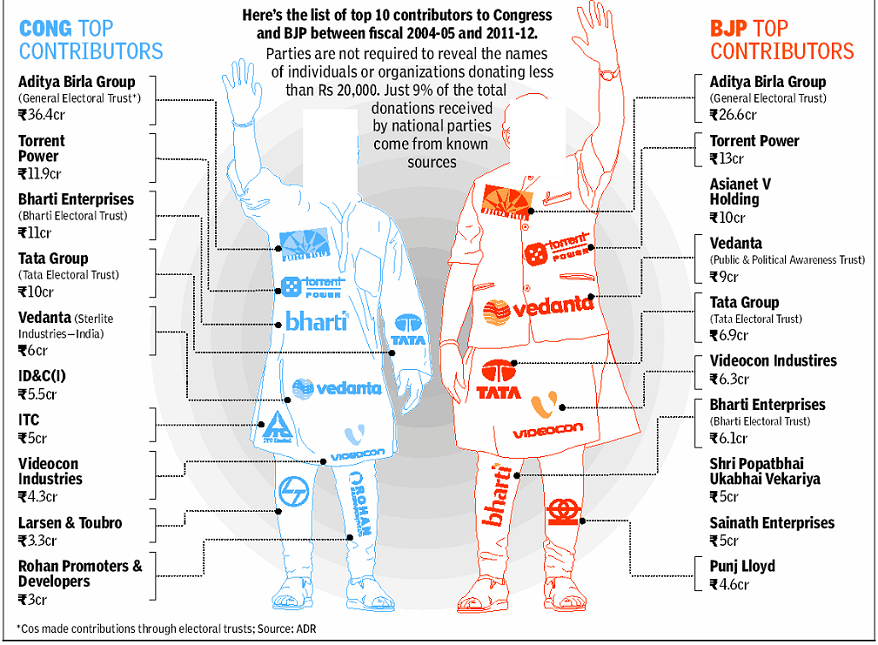
2012-13: big donors prefer BJP over Congres
Did big donors pick BJP over Congres?
In 2012-13, Saffron Party Collected 83Cr, Its Rival 11Cr, Show Papers Filed With EC
Pradeep Thakur TNN The Times of India
New Delhi: The BJP’s coffers had started swelling much before support for its prime ministerial candidate Narendra Modi turned into a wave. The party collected a record Rs 82.82 crore from declared donors in 2012-13, leaving the ruling Congres trailing in its wake with just Rs 11.42 crore in the same period.
This was revealed in the latest contribution reports submitted by parties to the Election Commission (EC) in which they have to declare donations in excess of Rs 20,000. While BJP’s contribution report runs into 188 pages, and was among the last few to be filed with the EC on March 26, the Congres report ends in 49 pages.
These contributions, however, are just a fraction of what the parties actually receive. Up to 90% of the funds of these parties come through sale of coupons and other sources where donors’ names are not disclosed. BSP has claimed year after year that all its donations are less than Rs 20,000 each. Like BSP, other parties such as Trinamool Congres and AIADMK have said they did not receive any contribution above Rs 20,000.
NCP and CPM are among those yet to submit their contribution reports, sources said. CPI declared Rs 37 lakh in contributions and named its donors.
The income of parties for 2012-13 will be known only after a year when they file their I-T returns. As of now, the 2012-13 contribution reports are the latest available data on parties’ income.
A request is pending with the Central Board of Direct Taxes to investigate the accounts of all major parties which have together earned more than Rs 4,900 crore between 2004-05 and 2011-12. The Association for Democratic Reforms, which has analysed parties’ income through their I-T returns, has petitioned CBDT to probe these anonymous donors.
The biggest beneficiary in the eight years has been Congres, having collected more than Rs 2,300 crore, followed by BJP with a total income of Rs 1,300 crore. BSP, which claims all its donors are anonymous, collected Rs 497 crore. CPM collected Rs 521 crore, NCP Rs 201 crore and CPI Rs 10 crore.
Elections, funding of
The Times of India, July 24, 2011
Jagdeep’s Chhokar
Who should pay for elections? Not the state
The persistence of the political establishment has to be admired. Just as it has successfully prevented all attempts at instituting any effective check on corruption for 42 years now, it has been trying to bring in state funding of elections for 37 years. And now, a new attempt is underway.
The law minister announced in December 2010 that regional and national consultations on electoral reforms would be held all over the country in association with the Election Commission. The last of the seven regional consultations was held in Guwahati on June 5, 2011. The national consultation, originally scheduled for July, is yet to happen.
Without waiting for the consultation process to be over, the law ministry has prepared a draft Cabinet note, proposing state funding for women and SC/ST candidates, and circulated it to several ministries for comments. The note repeatedly stresses that there has been “complete unanimity on the need for curbing the role of money power in elections”, thereby creating an impression that, by association, the unanimity was on state funding of elections, whereas state funding was consistently opposed by no less a person than the chief election commissioner (CEC) himself in all the seven regional consultations.
With the concluding national consultation being expected within the next month, what’s the need to initiate the note now? Another question: is the outcome of these consultations pre-determined? If yes, then why hold the consultations?
The draft Cabinet note uses two clever stratagems to make a beginning towards its aim of getting full state funding for elections. The first is the “footin-the-door” technique. The note proposes state funding only for women and SC/ST candidates, for now. The actual intention comes through in a paragraph that says, “Keeping in view the overall interest and the economic and financial scenario in the country, it may not be desirable to consider full state funding at this juncture.” It is obvious that full state funding is intended to follow at some suitable juncture in the future.
The other stratagem is to link the proposal for state funding with a persistent demand—disqualifying people with criminal cases pending against them from contesting elections. This provision comes with several safeguards which have a strong potential of rendering it toothless in implementation. Repeated reports, commissioned by the government itself, have unambiguously recommended that state funding of elections should not even be thought of, before some pre-requisites such as internal democracy in political parties and complete transparency in their financial affairs is ensured.
The most cited report in this connection is that of the Indrajit Gupta committee submitted in 1999. The paragraph of this report, quoted most often by the political establishment, says, “The committee sees full justification, constitutional, legal as well as on grounds of public interest, for grant of state subvention to political parties, so as to establish such conditions where even the parties with modest financial resources may be able to compete with those who have superior financial resources.” This clearly gives the impression of the well-endowed political parties being in sympathy with their less-endowed brethren.
Those who quote the above paragraph overlook, intentionally or otherwise, the opening paragraph of the “conclusion” of the same report which says, “Before concluding, the committee cannot help expressing its considered view that its recommendations being limited in nature and confined to only one of the aspects of the electoral reforms may bring about only some cosmetic changes in the electoral sphere. What is needed, however, is an immediate overhauling of the electoral process whereby elections are freed from the evil influence of all vitiating factors…. Meaningful electoral reforms in other spheres of electoral activity are also urgently needed”.
The Law Commission, in its 170th report, the most comprehensive document on the subject, titled “Reform of the Electoral Laws, said in June 1999: “…(I)t is absolutely essential that before the idea of state funding (whether partial or total) is resorted to, the provisions suggested in this report relating to political parties (including the provisions ensuring internal democracy, internal structures) and maintenance of accounts, their auditing and submission to Election Commission are implemented…. (T)he implementation of (those) provisions…should be pre-condition to the implementation of the provisions relating to partial state funding…. If without such preconditions, state funding, even if partial, is resorted to, it would not serve the purpose underlying the idea of state funding… The state funding, without the aforesaid pre-conditions, would merely become another source of funds for the political parties and candidates at the cost of public exchequer… The state funding, even if partial, should never be resorted to unless the other provisions mentioned aforesaid are implemented lest the very idea may prove counter-productive and may defeat the very object underlying the idea of state funding of elections”.
The dangers of state funding have not only been pointed out by government appointed committees and commissions but also by the Election Commission, and by CECs individually. Former CEC, J M Lyngdoh said: “That is a useless thing. It is a red herring. It doesn't help anybody.” The current CEC, S Y Quraishi said, “State funding is dangerous. It will not stop illegal expenses…State funding will not stop illegal expenses. In fact, more money will be available to the candidates.”
The proposal to introduce state funding for a section of the candidates, despite all the cautions and warnings, does make one wonder about the real intentions behind the move. There are no prizes for guessing the answer, and one wonders if the change of the law minister will change anything.
2013-14
Dec 25 2014
90% of political fundings in 2013-14 came from India Inc'
Who funds political parties? Corporates do.According to an analysis by the Association for Democratic Reforms (ADR), 90% of political funds have been contributed by corporates or business houses. Roughly about half the amount donated to political parties came from Delhi followed by Maharashtra and Gujarat. This is based on declaration of donations submitted by parties to the Election Commission. While BJP is yet to submit details of its donors for 2013-2014 to the Election Commission, three national parties -Congress, NCP and CPI-received 517% more funds than the previous year (2012-2013).
Total donations received by national parties were Rs 76.93 crore from 881 donations. Incidentally , dona tions to Congress increased from Rs 11.72 crore during FY 2012-13 to Rs 59.58 crore during FY 2013-14 (408% increase). Donations declared by BJP during 20012-2013 were more than the aggregate declared by Congress, NCP, CPI and CPM during 2013-2014.
ADR founder-trustee Jagdeep Chhokar said, “90% of donations coming from corporates show the increasing hold of the corporate sector on political parties which is somewhat disconcerting.The ruling party not submitting its donation report is not a good sign as it possibly indicates a lack of respect for integrity of institutions which is not healthy for a democracy .“
A total of Rs 45.49 crore was donated to national parties from Delhi by both corporates and individuals together followed by Rs 18.12 crore from Maharashtra and Rs 3.01 crore from Gujarat.
2013-14: contributions vs expenditure
Feb 12 2015
Pradeep Thakur
EC for probe into LS poll funding
The Election Commission (EC) is in the process of sending donation details of all political parties to the Central Board of Direct Taxes (CBDT) for a probe by the income tax authorities to ascertain whether entities making contributions were genuine. What has rattled the poll watchdog is the huge expenditure made by some of the leading parties during the Lok Sabha elections in March-May last year, disproportionate to their declared sources of income.
BJP, which claimed it received Rs 363 crore in 2013-14 (up to March 31), has shown an expenditure of Rs 714 crore during the LS polls. The donations declared by parties are those in excess of Rs 20,000 each. Except for DMK, none has declared total contributions received in the last fiscal. DMK has revealed that it got Rs 80 crore, but its individual donations in excess of Rs 20,000 were to the tune of Rs 77 lakh only . Congress spent more than Rs 516 crore during the parliamentary polls, according to the EC. However, information submitted to the Commission show total contribution declared by the party at Rs 59 crore. The remaining list of donors has not been made available.
Similar was the case with NCP which received Rs 15 crore in contributions for which it has furnished details to the Commission.
But its overall expenditure during the Lok Sabha polls was Rs 51 crore.
Mayawati-led BSP has said it did not receive a single contribution which was above Rs 20,000. But the party’s expenditure was Rs 30 crore during the LS polls. The Aam Admi Party, which drew a blank in Delhi during the parliamentary polls, has so far not submitted any expenditure details.
It is mandatory for political parties to report all their contributions received in a financial year before the date of filing of their Income Tax returns. In 2013-14, the due date was extended to November but the BJP was the last to submit its report on December 20.
Delaying submission of contribution reports beyond the due date can lead to parties facing penal action such as withdrawal of their I-T exemption and payment of tax on such contributions.
Even with the partial disclosure of contribution, leading national parties seem to have made a windfall in the LS election year.
The Congress received Rs 12 crore in disclosed contributions in 2012-13 which increased to over Rs 59 crore in 2013-14. The BJP received Rs 83 crore which increased to Rs 363 crore during the same period.
2014: receipts and expenditure
The Times of India Mar 03 2015
LS poll-eve NaMo blitz cost BJP Rs 700 crore: ADR
The Modi blitzkrieg unleashed before the Lok Sabha polls cost BJP over Rs 460 crore in publicity , with total spending going up to Rs 712 crore. In comparison, Congress spent Rs 486.21 crore and NCP was a distant third, spending Rs 64.48 crore.Over a decade (2004-2014), funds collected by national parties increased by 418% while spending went up 386%. The national parties considered for the report by the Association for Democratic Reforms (ADR) are BJP, Congress, BSP, NCP, CPI, and CPM. Total funds collected by the parties during the LS elections held in 2004 was Rs 223.80 crore while during the LS 2009 polls donations increased by 282%, to Rs 854.89 crore. In 2014, funds increased by 35.53% to Rs 1,158.59 crore.
Predictably , BJP declared the highest amount of funds collected during the 2014 LS polls. The party declared collecting Rs 588.45 crore over 75 days of the election period followed by Congress, which collected Rs 350.39 crore, NCP with Rs 77.85 crore and BSP with Rs 77.26 crore. CPI declared the least funds collected (Rs 9.52 crores).
The saffron party was also the highest spender in the 2014 polls. The party declared expenses of Rs 712.48 crore over 75 days followed by Congress at Rs 486.21 crore, NCP at Rs 64.48 crore and BSP at Rs 30.06 crore. CPI declared the least amount of poll expenditure (Rs 6.72 crores).
Total spending incurred by parties during the 2004 LS polls was Rs 269.42 crore, which rose by 225% to Rs 875.81 crore. Expenses on the 2014 polls increased by 49.43% to Rs 1,308.75 crore. Spending over a decade increased by 386%.
Over a period of 10 years, parties spent half their bud get on publicity (50.58%), 19.68% on travel expenses, 15.43% on candidates and 14.31% on other expenses.
During LS 2014, BJP declared spending Rs 463.17 crore on publicity while Congress spent Rs 346.41 crore, NCP declared a bill of Rs 30.98 crore, BSP of Rs 12.75 crore while CPM and CPI spent Rs 4.94 crore and Rs 0.72 crore respectively .
2014-15: Donations to parties increase 151%
The Times of India, Dec 08 2015
Donations to parties jumped 151% in 2014-15, says ADR
Donations to po itical parties increased by 151% this year as compared to the last year, but details regarding donors continue to remain elusive. National political parties received Rs 622.38 crore from 1,695 donations in 2014-2015, as compared to Rs 247.77 crore collected last fiscal. While Congress did not disclose cheque or DD numbers for 192 donations amounting to Rs 138.98 crore (that's 98% of its contribution), BJP did not give the PAN card number, address and mode of contribution for 20 donors who contributed an amount of Rs 83.91 lakh. Political parties rely heavi y on donations for contesting elections and running their daily affairs. They receive huge sums of money in the form of donations from corporates or business houses, trusts and individuals. Section 29C of the Representation of the People Act, 1951, mandates that political parties submit their contribution details in excess of Rs 20,000 received from any person or a company to the Election Commission of India annually , in order to enjoy 100% tax exemption, which has been analysed by Association for Democratic Reforms (ADR) With 1,234 donations from individuals and corporates, BJP tops the list and has declared a total of Rs 437.35 crore as received via voluntary contributions of above Rs 20,000.The donations declared by BJP are more than twice the contributions declared by Congress, NCP, CPI and CPM in the same period.
BSP declared that the party did not receive any donations above Rs 20,000 during FY 2014-15, as it has been declaring for the past 10 years.
Among donations, NCP appears to have recorded the highest increase -from Rs 14.02 crore in 2013-14 to Rs 38.82 crore in 2014-15 -while donations to BJP increased from Rs 170.86 crore to Rs 437.35 crore in the same period (156% increase).
Bharti group's Satya Electoral Trust was among the top donors, donating Rs 132 crore to BJP, Congress and NCP.
Satya Trust said in a statement attributed to Mukul Goyal: “We are an independent trust and are not a Bharti group trust. During the year 2014-15, Bharti group had contributed only Rs 31 crore to our trust, out of a total of approximately Rs 141 crore worth of contributions received by us from various corporates which included Hero Motocorp Ltd, Jubilant Foodworks Ltd, GMMCO Ltd , National Engineering Industries Ltd Orient Cement Ltd, DLF Ltd JK Tyres and Industries Ltd India Bulls Housing Finance Ltd, Kalpataru Power Trans mission Ltd etc. A total of 18 corporates contributed during the year 2014-15 . These contri butions were utilised for giving political donations across political parties during the said year.“
The Trust donated Rs 107.25 crore to BJP (25% of total funds received by the party), Rs 18.75 crore to Congress (13% of tota funds received by the party and Rs 6 crore to NCP .
General Electoral Trus had not made any donations to national parties last year, bu contributed a total of Rs 117.30 crore to BJP and Congress.
While BJP received Rs 63.2 crore (14% of tota funds received by the party) Congress received Rs 54.10 crore (38% of total funds re ceived by the party) from the Trust during 2014-15.
